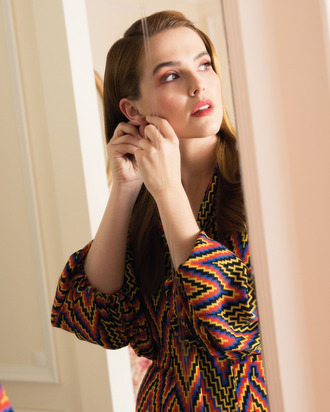
Photo: JAKE ROSENBERG / TRUNK ARCHIVE
Zoey Deutch is fixing me with a soft stare that does not match the intensity of the questions she just asked me, which are: “Do you believe in an afterlife? Do you believe in reincarnation? What do you believe in?” We’re nursing pots of black tea at the Plaza Hotel across from Central Park, and she’s been interviewing me for nearly two hours.
“I don’t think it’s fair for a writer to come and look me up and me not look them up,” she says, explaining that she’d Googled me extensively; “I read all your stuff, looked through your things.” And she had, including a small novel on immortality; apparently, now, she wanted to get her money’s worth by asking me about death and God and other things I wasn’t prepared to talk about at high tea.
She’s barefaced today, with her hair in a tiny ponytail and a minimalist, designer outfit; its focal point is a Kenzo coat covered in Illuminati eyes. “I call it my conversation piece, I could talk about it all the time. I wear it so much that I have my lines — I got eyes everywhere, I got eyes everywhere!” she hoots, throwing out finger guns.
The bit reminds me a little of Peg Dahl, the fast-talking heroine of Deutch’s new movie Buffaloed. The film is sort of like a blue collar Big Short, with Peg as its charismatic center; she dreams of a college education and financial freedom, but ends up in prison after scalping Buffalo Bills tickets. Eventually, she starts running her own debt-collection business in Buffalo, New York; mafia-style shenanigans with a rival business ensue.
Like Peg, Deutch speaks in quick, full paragraphs, dad jokes on hand. But her in-person demeanor is more like Harper Moore, her character in the 2018 Netflix romcom Set It Up, a 20-something intern trying to figure it out in New York. Deutch, who is 25 now, has the same kind of intense, self-deprecating moxie that makes Harper so charming.
Photo: jake Rosenberg / trunkarchive.co
As we talk, Deutch, who calls herself a “connection junkie” continues to turn on me with her “what about you?” refrain. I haven’t been a journalist for long, but one thing I have experienced when speaking with celebrities is that they mostly know the bare minimum about whom they’re speaking with; who you write for, your name, maybe. I was bewildered by Deutch, who knew things about me that are hard to find on the internet. But we’d had some Champagne, so I explained to this woman I’d just met my thoughts on death and God. That I was raised in a mixed-race, Sikh household that was religious and fractious and isolated. Probably, as a result, I’m extremely not religious.
Deutch nods thoughtfully. She starts to tell me about her approach to spirituality, which she qualifies comes from “a place of privilege.” She recalls, fondly, her Bat Mitzvah, and how religion for her is all about “being a part of something greater” and “asking questions and being curious.” Given this sort of liberal spiritual oeuvre, I wonder why she passed on palm reading, the activity I’d suggested in lieu of fancy tea. “Well what if I found something scary?” she shudders. Her grandmother, Deutch says, was a psychic, and her mom, actress Lea Thomspon (Back to The Future) is a little bit too. “I’ll get scared about something and I’ll be like, What if I’m psychic?” she says of her own intuition, “but it’ll be so wrong.”
Inevitably, she faces charges of nepotism — her father is director Howard Deutch (Pretty in Pink, Some Kind of Wonderful) — but critics agree on her talent, labeling her with terms like “powerhouse,” “force of nature,” “scene-stealer,” and “virtuoso” in reviews. And her work is good, and versatile: she recently starred as a baby-voiced victim of Munchausen syndrome by proxy in The Politician and a late-aughts Paris Hilton composite in Zombieland: Double Tap. I loved her most as a high-school mean-turned-nice-girl in Before I Fall, a sort of YA Russian Doll. For the most part, like the real-life Deutch, her characters are smart, funny women who are more complicated than they first seem.
Deutch lives in Chinatown now, where she says no one recognizes her. But it may not always be that way. “I don’t know. I don’t really know anything at all,” she says of what’s up next. But acting, she says, is what she’s always wanted to do. Her tattoos — including a giant YES to remind her to stay optimistic — are all ankle-down so she doesn’t have to spend too much time in makeup. “I would love to know. Literally right before we met I was on a call, like trying to figure out that question, what’s in the future.”
She gazes at a neighboring table; her expression one that I recognize in myself and my peers. “Those decisions are hard, but I haven’t made them yet. They’re fine right now, because I’m here having tea with you. What about you?”




